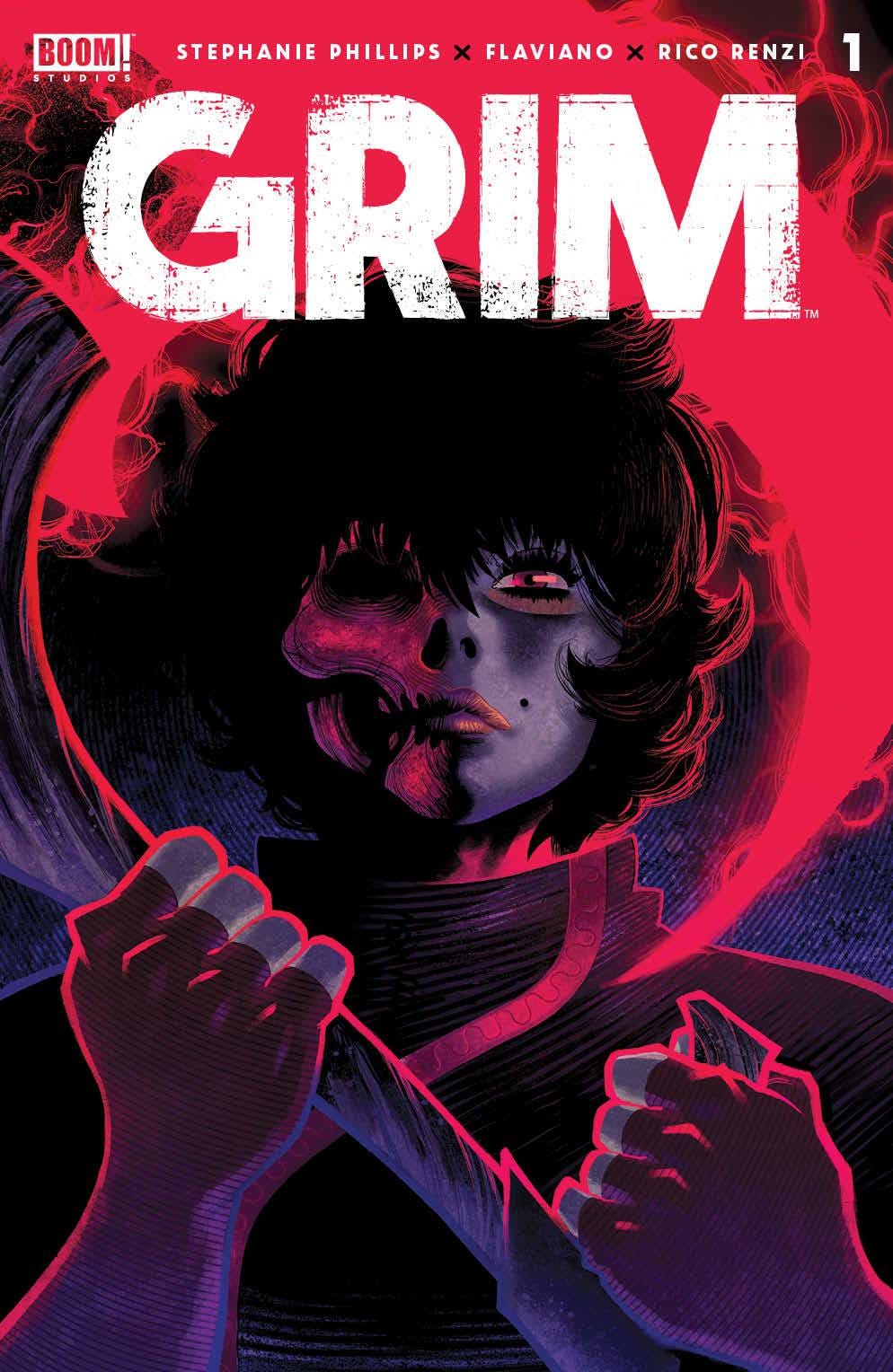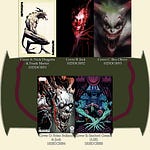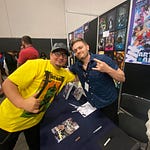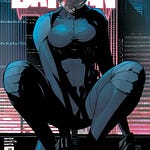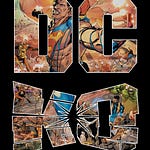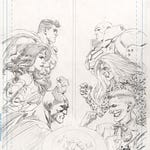Hey guys, it's Scott.
It's Tuesday, August 30, and I can't believe summer's over (or almost over for those of you still clinging to the last days of sunshine). I have one kid who is just in his second day of 10th grade, which I can't believe—he's a real teenager, and then another kid who is inside desperately finishing all the reading he was supposed to do for school over the summer and didn't want to, of course, and then a three year old who’s just, like, happy to be here.
So this week, we have some big stuff. First, we have Barnstormers: A Ballad of Love and Murder #2 out from Comixology Originals. It’s co-created by the great Tula Lotay.
It's a series about a guy who claims to be a WWI pilot and is now daredevil-ing across the country when he crashes into a wedding and winds up taking the bride with him. The two of them have a darkly comic adventure and romantic journey together across the United States of that time. And it’s set against the Roaring Twenties and the book is largely about how that moment a hundred years ago has a lot of parallels to this one, especially in the ways in which the wealthy of that time has reflected in all the Gatsby-era pop culture stuff that we have now.
They’re sort of partying it up and taking it as a moment of relief after some turbulent times, both with WWI and the influenza pandemic, and instead of digging in and trying to create a new social contract across the board, with workers, with labor, just collectively with the country as a whole, seem to be more and more determined to isolate their wealth and take it away from the rest of the country. And I think that's the context or the background of that book. Even though the focus is on two young working class kids that decide they're going to fly across the country and sneak into a lot of wealthy people parties and rob them without anyone noticing. So anyway, it's a book I'm really proud of, I hope you'll check it out.
Again, all the books this time in this second wave are creative leaps for me. I’m trying different genres, working with different creators than I've worked with before, great people, great talents, but also they're pushing different boundaries creatively for me as a writer and forcing me to be a bit more elastic and it's a real invigorating experience. So they’re books that are maybe more surprising in different ways than things that I've done before, but I think are really personal and books that I'm passionate about and that speak to things that matter to me and my co-creators, so I hope you'll give it a shot.
Also, we've got the FOC date coming very soon for both the Nocterra: Val Special, which is coming out in October.
It's drawn by the great Francis Manapul, who's a dear friend. It’s a special. Again, it's a number one, it's going to be collectible. We have the series over at Netflix, things are going well, I hope you'll check it out. And then the third arc in earnest comes back and winter, can't wait to do it, it's going to be a blast. Tony is already rocking out on it. But it's kind of like Aliens to Alien, where it's, like, more monsters, more trucks, more cosmic mayhem. So we want to give him a lot of lead time to be able to just explode on the page.
And then we also have Night of the Ghoul out from Dark Horse, our Comixology Originals book.
It's me and Francesco Francavilla and it's about a lost great horror movie from the 1930s in which the monster, the Ghoul, might actually be real and haunting the building in which the main character, Forest Inmann, has come for the night to try and interview the director of that movie who is in hospice care. So it's a double helix structure where half of it is the burned remnants of the original monster movie and done in black and white and half of it is a modern terror narrative where the main character is finding out that all of the things that he thought were fictional about this movie might be real, and that he's trapped in an old age home with somebody who might be far more dangerous than he thinks. So it's a lot of fun, I hope you'll check it out.
I'm really proud of both of them and I'm really grateful for the support and critical acclaim when this one came out digitally. So yeah, so FOC for both of those, Tyler, if you can put them here with the order numbers, I hugely appreciate it. We really, really can't thank you enough for all the support.
We're going to do a business class in September for paid subscribers where we really get into the mechanics of being a writer as a job. I'm really excited about this one, everybody jumped at it when I asked if you guys wanted to do this one last one before we start looking at your work. So this is going to be the one that's all about the questions that no one wants to ask or answer in creative writing workshops because everyone is too focused on craft and that was always something that was really frustrating to me when I took workshops.
I wanted to know how much do you make, like, what is a page rate? What is an exclusive contract? What does it mean if you have something optioned? What are ancillary rights? If you have something optioned, how long before it comes back to you? If they purchase it, do you ever get it back? Are there different kinds of deals? What does it mean if you give up 50% of your rights? What does it mean to have an agent? What does an agent do? What does an agent take? All of these kinds of questions that I feel are crucial to understanding how you make a living as a writer, we're going to talk about. So that's going to be our September class, and then probably either at the end of September or October, we'll start Comic Writing 102 officially. Can't wait, really excited for it.
New York Comic Con, again, we're going to do a lot of fun stuff, but the Founder’s Tier is going to re-open for this in mid to late September after everybody in the Founder’s Tier has a chance to send in their books. Remember, the deadline is September 12th, so send them in now. And also after you receive your first three exclusive covers and extra goodies being sent to you by Comic Sketch Art on September 2nd. So all of that will be fun.
Now, I wanted to talk for a minute, I feel like I was gonna say this last time and then I got caught up in all kinds of stuff, from the Yankees completely falling apart on us in my 11 year-old’s, like, emotional breakdown over that and all kinds of end of the summer stuff, like losing my passport and crazy shit like that. But I wanted to do a post because people were asking me when do you know it's time to leave a character? When do you know it's time to get off Batman, for example, for me, or stop doing a series even like American Vampire, when do you know it's time to close down shop? And so for me, there are a couple levels of this. There was Batman, then there was sort of DC as a whole with Metal, there's creator-owned… so I'm gonna start with something like Batman.
Okay, so Batman for me, when I got Bruce Wayne in the New 52, first I was just terrified, like I've said many times, so it was really just let me tell one story that I'm going to swing for the fence with Court of Owls and if I get it through, I don't care if they fire me afterwards. And that's kind of the way I think most people operate when you first get on a character. And that's the way I would honestly tell you to operate—you're up at the plate, swinging for the fence. Don't play small ball, don't bunt, don't try and get a single. You might only get his one chance, so if you see your pitch, which, the book is your pitch, go for it.
So anyway, it took me about a year and a half to two years to even get comfortable to feel like well, I'm not gonna get fired. And then when I did Zero Year with Greg, that was the moment when I felt like we owned our version of the character. We had rebuilt him from the ground up, he was designed to be inspirational rather than intimidating and he was meant very much as a post-9/11, 2010s Batman that was addressing things that I think my kids were afraid of, all kinds of stuff like that. So it was very much ours. And then after that we did Endgame, which for me was like the closing down of our Joker story.
And then it became that DC was very much about, well, why don't you do either small Batman stories with different villains? Or try and do something again with Joker, because it had done so well. Maybe you kill Joker. Dan DiDio was very much about killing the Joker. He was very much about what if you kill Batman and instead make Lincoln March the new Batman, there was a lot of stuff like that. And for me, it was one of those moments where I realized I had a couple more things to say with Batman. One was, I wanted to show the way in which he only exists as a fictional character, that when you start to apply him in the real world in all kinds of ways, or apply him to specific situations where you say, this is the way Batman needs to work, he can't do this, he can only do that he has to be this way, he falls apart.
What makes Batman so enduring is the fact that he's such a open, simple concept. Again, there are only a few things about Batman that really are always true, and other versions of the character can stretch him to places that I might not take him, but they start at that same core center, which is he goes out every night and tries to prevent the same thing that happened to him from happening to other kids, and he puts his life and body on the line, and is the most determined to do this of any character you'll ever find. He never quits. And that's that's kind of it, everything else, whether he loses his money, has his money, whether he gets romantically involved as not, whether he decides to kill somebody or not, all that comes from that.
And for me, it became, well I wanted to do this story. And it was a moment when I felt like Batman was getting pulled in a lot of directions in pop culture where it was like, should he be on the side of the city or the people, or would he believe in certain causes, would he not believe in certain causes? All this discussion was nuts to me, because Batman himself, he can be applied to anything in that way. And so I have my own opinions of what my version of Batman would believe and who he would side with in different ways, and those are mine. But the point is, as a construct, Batman can exist as a fictional character only, like as a cipher.

So we wanted to do this story Superheavy. That was one of the things I was proud of stuff on the book, that we were able to do a story where we made him human and away from Batman and gave him a chance to live his life. And then he realizes the only way for Batman to live is for Bruce Wayne as a real human being to die and for Batman to become the legend again that he always has been. And so it's a personal story, but it had a different level of ambition.
And then when we were done with that, I really wanted to rest on Batman and felt like we brought everything back. I had some ideas for some smaller stuff I wanted to do that felt like if I did them in the main book, at that point, it might be diminishing returns, and Greg really wanted to go do some indie stuff, so it felt like staying on Batman but working with different artists just didn't feel right. So it was like “alright, well let me do All-Star Batman. Step aside, let Tom take over and I'll do kind of strange sort of off kilter Batman over here.”
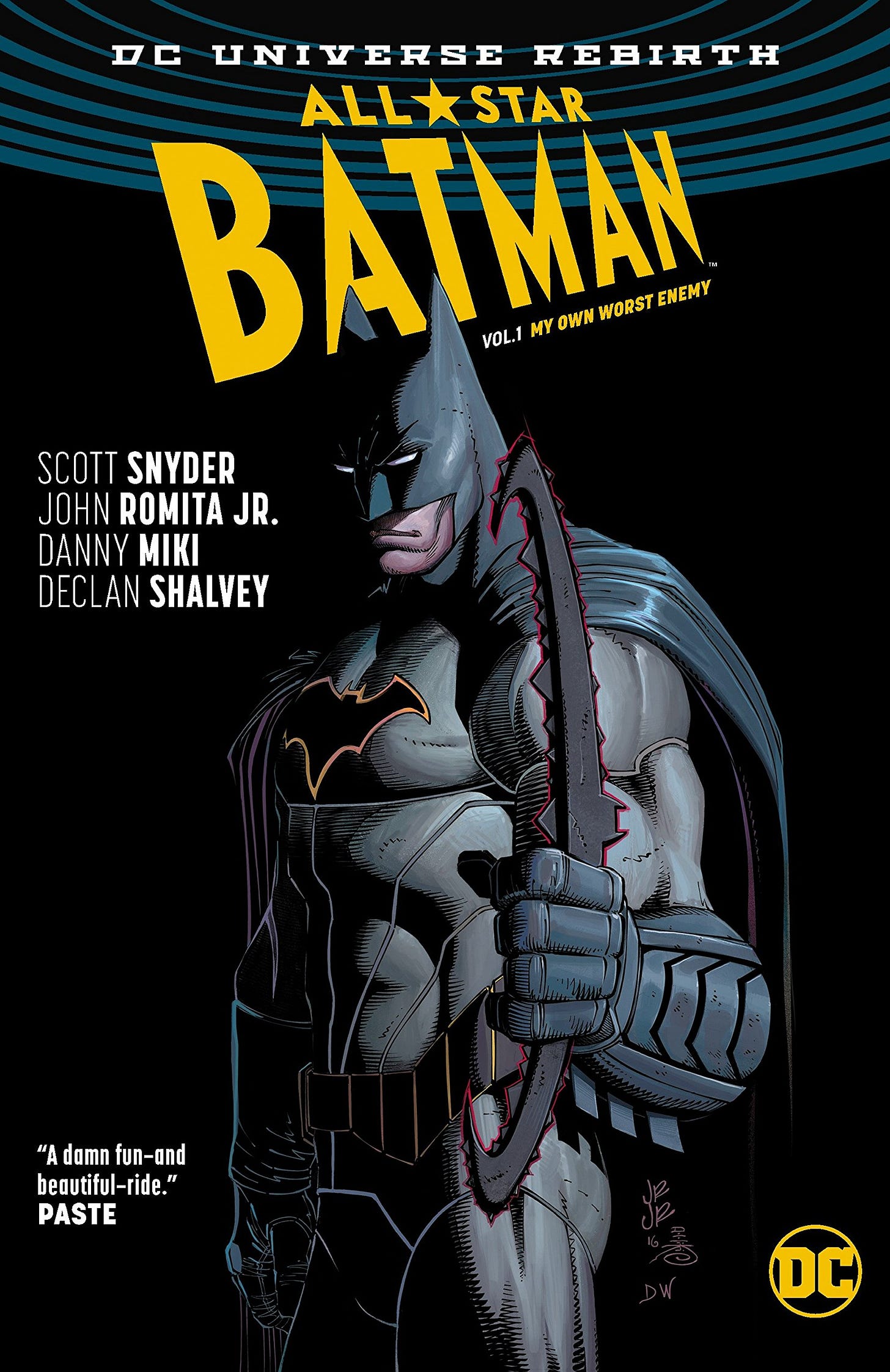
I was gonna do grindhouse Batman with Two-Face with John Romita Jr., I had one lined up with Sean Murphy we didn't get to do, but then I did Mr. Freeze with Jock and then I did a whole thing that led up to Metal with everybody from Cammo to Tula Lotay. And it was experimentation, and it was so fun because it was like that thing that Grant says about how sometimes when you're finished with your main run of the character, you get some of your best ideas. And so it was about letting me do these small things that I wanted to try that wouldn't exist under the scrutiny and the pressure of the main series where it had to sell over 100,000 all the time for the company to be healthy.
And so after that, after we did those, and I really love All-Star Batman, I hope you guys will check it out when you get a chance. It's definitely different, very different than the Batman run that we did. It's trying stranger ideas and trying to really tonally shift things around and play with Batman and push things in different directions for me and flex different muscles. And then it became time for Metal, which we had had in our head for a long time and it was like, okay, well, this is my Batman in the DC stuff. It was the leveling up to the cosmic from the grounded.
And my point, without sort of walking you through everything—if you ever want me to walk you through the process of doing Metal and then Justice League and Death Metal, which are a different chapter for me than just doing Batman, I'm happy to do it. But essentially, for me, Batman finished when we did All-Star. Everything else was more moving into being the point person writer at DC for events in that way, outside of what Geoff was doing with Doomsday Clock, all that stuff.
So for Batman, for me, it was when do you step off? When do you step off altogether? Do I still have ideas for Batman? I do 100% still have, I have a lot of ideas, I have things that I wanted to do. Scarecrow was a big one. I really had an idea that I wanted to do with Penguin about class in Gotham City. I wanted to do one with the Owls again, I thought about bringing them back in a different way. But I think what happens is, and this is my best advice, it’s the thesis of this long and rambling post. I think the idea is, really, that when you know in your gut that it's safe, that you're doing things that are less ambitious or aren't as scary to you as the things that you were doing before, it's time to leave. That's really what it was.
Was it as scary doing All-Star Batman? No, in the way that I didn't feel the pressure. But creatively it was definitely as scary, because it was trying things I had no idea if it would work. It was Batman traveling cross country and our first arc chained to Two-Face with John Romita Jr. in the daylight with chainsaws and trucks and KGBeast and it was just nuts. Like it was a level of zaniness and humor that prepared me for Metal, I was kind of training for what I wanted to do with Metal, but I didn't know would work on Batman at all. And then moving from that to the opposite end of the spectrum in All-Star and doing a much more dark story with Jock and Tula and Cammo about Batman in Washington and all kinds of stuff and an end of the world kind of apocalyptic feel, and then doing the one with Rafael that I love about Alfred and Alfred’s clone which, again, I can't believe they let us get away with, but I love.
All of that stuff to me was scary, creatively. It was like, is this gonna work? I had no idea, like none. But it wasn't scary, pressure-wise, the way Batman was, because I didn't need to sell huge and all that. But what I mean is when creatively you feel deep down like you're not risking as much, you're not pushing yourself, you're falling back on things that are comfort food or safety net stuff, then it's time to go. And I don't mean to say that as somebody in a privileged position where it's like, well just leave a book where you're making good money, I get it. I get staying on when you're on a popular book. But creatively I can name so many people that I feel like you see on books that are still playing with characters that you're like, “this is just diminishing returns.”
It's hurting your relationship with fans because they can see that you're not bringing your best ideas anymore, or your most daring ones. You're doing it in a way that maybe pokes the bear in different ways, but isn't particularly ambitious. Given the things that you've already done. It's kind of echoes of stuff you've done. Again, there's nobody I have in mind, I'm not I'm not trying to throw shade on anyone out there right now. I think people that I know are returning to characters that they've used before, like Dan Slott. He's somebody who, when I was on Batman, I marveled at his constant reinvention of a character. So if he goes back to Spider-Man now like he was saying, I'm first in line to buy that, because I believe he would never do that out of love for that character without having incredible ideas.
But I think in the past, I'm thinking more of people that I grew up with than people right now. But people that you know stayed on a book a while too long, people that came back, did it again, even though you’re kind of like ehhh. And that's really what it is. If you are not scared on the character, if you're not doing something creatively daring for yourself, then that's when it's really time to leave, in my opinion. I don't know. I know it sounds like a simple answer for a long diatribe about what it was like to work on something like Batman. But again, for me, I have ten ideas I'd love to do, but I don't want to do them right now because they're easier to do and safer to do than other things that I haven't tried yet with other characters. And they're also safer and easier to try it and things that I haven't done with my own work.
So it's about those two rules that I try and remind you guys of in class constantly, whichever are 1) You've got to write the story you'd love to pick up and read more than any other. Like, today would I love to pick up a Scarecrow story that has some of the stuff I wanted to do with it? Yeah, I'd love to. But would it be my favorite? No. And then 2) You've got to be the most exciting writer to yourself at all times. That's really what it is. So that means not doing the thing, sometimes, that would be fun and easy and safe and all that, which sucks, but it's true. Sometimes it means doing the thing that scares you to death. But that's how, in my opinion, you create longevity as a writer, you create a fan base that trusts you to always be pushing, and above all, that you create a sense of yourself as a writer, and a confidence that I think will carry you through multiple years in this industry. Once you start trying to chase former sales or popularity on a character, that stuff, most of the time it feels like it kind of falls through.
So anyway, that's kind of my, my two cents on it. And again, I'd love to hear your thoughts. This is not intended to be like this person stayed too long, or this person shouldn't have done this or like, hey, name your examples. It's more that I’d love your thoughts on what you think about when it's time, just emotionally and psychologically, to step away, and what have been some of your favorite run moments and post-run moments, even, when somebody has found that magic after the fact, after the big run that they did when they're doing stuff on the side. Or they're doing stuff that comes in from left field and says “wow, this makes me rethink the way they approach this character altogether.” Alright guys, thanks!
S
P.S. Before I forget, a couple of books that pick up I have been loving Grim from Boom Studios from pal Stephanie Phillips and Flaviano.
It's about a woman who is a reaper and takes souls down to the afterlife and then finds herself involved in a mystery and adventure after one guy soul steals her scythe. So you must check it out, it's great.
And then also a book that I've only read the first issue but I really liked it. It's called New America.
It's by Curt Pires, who's done a lot of great stuff so far (Youth and a bunch of other good books) and Luca Casalanguida and it just pictures in America that's been split by civil war. Check it out!






